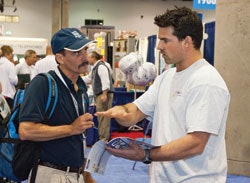While attending another fabulous Athletic Business Conference and Expo in December, we finally put our finger on why we enjoy the show so much. We certainly appreciate the privilege of presenting seminars, but the real fun and education comes from talking with people who run fitness facilities that aren't exactly like ours.
 For-profit club operators can learn from conversations on the ABC trade show floor.
For-profit club operators can learn from conversations on the ABC trade show floor.While attending another fabulous Athletic Business Conference and Expo in December, we finally put our finger on why we enjoy the show so much. We certainly appreciate the privilege of presenting seminars, but the real fun and education comes from talking with people who run fitness facilities that aren't exactly like ours. There are attendees who operate hospital, military, nonprofit, college, high school and kids' fitness facilities, each of which are somewhat different. And yet, these all share a bond with for-profit clubs.
The expo floor, especially, screams "athletic" - scoreboards, synthetic turf and field maintenance equipment are among the really cool things you'd never see at a health club-only trade show - but the bond that's most evident is the "business" part. We're all in business, and our businesses just happen to be athletically oriented. When we meet, we talk less about treadmills than we do about the things that keep us all up at night, and we share stories and insights that will hopefully help each of us get through the next 12 months until we meet again. If you eavesdropped on the conversation in hallways and on the expo floor, you could be at the conference of any trade group or business you can imagine.
We think it's vital that we get out of our health-club bubble. For-profit clubs so frequently battle with nonprofits that we forget how much we have in common. One of the people we met this year was a Y personal training director who has been charged with growing her program's revenue by 40 percent next year. If we had read about that in a trade magazine, we'd have thought, "There they go again at the Y, running their business like a for-profit." But by meeting at the show? We brainstormed strategies to help her.
Do you think that university fitness centers have it easy? They don't have to worry about selling memberships to the public, and - to us, anyway - the stresses of the annual budgeting process are nothing compared to the stress of making payroll every two weeks. But if you think you have a tough time managing your younger staff members (see below), you've got nothing on university directors who have only young staff.
We also all share the challenge of being in a business that doesn't have the greatest reputation. We all deal with prospects who want to work out for free, because "You're open anyway, so can't I just use a treadmill?" Our most senior and educated staff people are asked by relatives, "When are you going to get a real job?" We live in fear of raising our prices, because the low-cost operators in our industry - thanks, guys! - have conditioned the buying public to think we're all worth just $10 to $30 a month.
And so, it was the challenges we all face that came up in conversation again and again, including four areas we see as the most important for all athletic-related business owners to address:
Culture. Some club owners we met have not effectively responded to the country's current economic realities because they are stuck with "the way we've always done it" - and that way was outdated at least three years ago. Other clubs are being held hostage by staff members in their 20s who seem to have arrived from Mars, and the rift between the "kids" and the "grownups" is glaring and damaging.
Owners and managers of many facilities don't seem to appreciate that, yes, they have a corporate culture, and they need to manage it. There are employees who work just for the money who are often at odds with those for whom fitness is a labor of love. To staffers in their 20s, denying them access to Facebook can be like cutting off an arm. For group fitness directors, the implementation of licensed classes such as Zumba might be a slap in the face. Your culture will determine how you navigate through these day-to-day issues.
Vision. A clear vision for any business must come from the top, and that vision has to be absorbed and supported by the front-line staff. When we spoke to club owners who were struggling, a common theme was that they knew where they wanted to take their business, but they either hadn't clearly articulated that vision, or their teams were fighting them. Fixing the first problem can be straightforward, whereas fixing the second might involve some unpleasantness. It's a cliché, but everyone must know where the boat is going and row in unison. The world is changing so fast that having even one person who does not buy into the program can have lasting and damaging effects, and we're not talking about general managers. The people on the front lines, who are likely your least experienced and lowest paid, must understand your corporate vision and why your facility is unique. If they do not know those things and are not reflecting this vision, it is your fault, not theirs.
Consistency. Culture and vision are great, but if there are inconsistencies in your business, culture and vision won't matter. At the conference, we met a very capable club manager who works in a high-end facility that prides itself on its personalized and detailed customer service. The problem? The club has such an egregious cancellation policy that every person who leaves does so with a bad taste in his or her mouth. Consistency of execution has never been more important than it is in the age of Twitter and Yelp, where one bad customer experience can be shared with the world and live on forever.
Role Modeling. The most interesting conversations we had at the conference were not about other fitness facilities, but about businesses outside of fitness and athletics that had something to teach us. There were stories about the corner oil-change place that offered impeccable service, and whose polite technicians up-sold services. We discussed hotels that provided creative and immediate responses to guest complaints. We found ourselves in conversations about Disney - how their employees are "on stage" and "off stage." Disappointingly, and somewhat unfairly, most of these conversations grew out of amusing war stories about failures in our own industry, and it was telling that the examples of how things should be done came from other fields.
We're back in our bubble, but a few days spent seeing our business through the eyes of similar but different fitness providers is helping keep our fitness business fit. The broader view should see us through all the way to Orlando in 2011 and beyond.




































